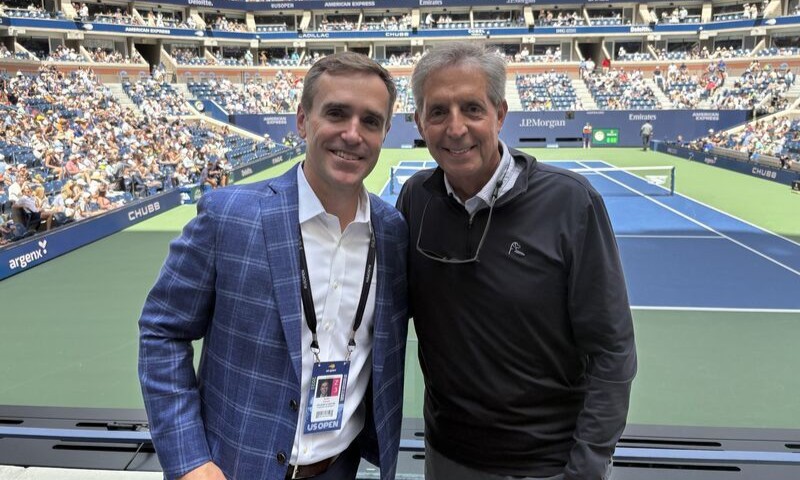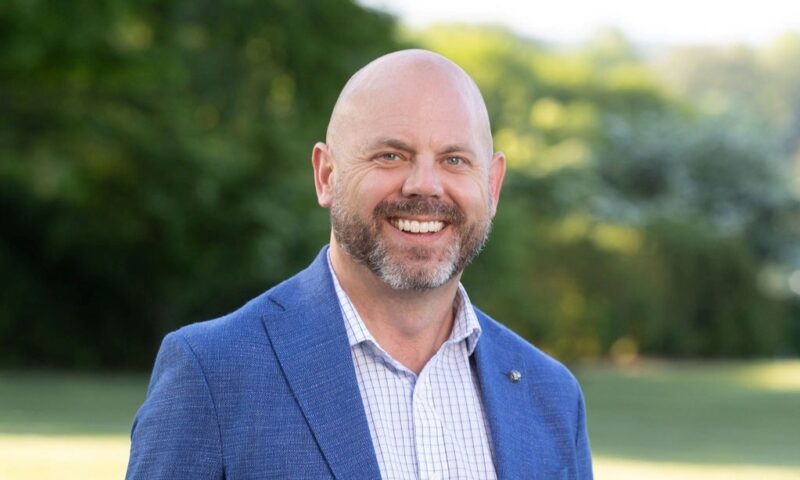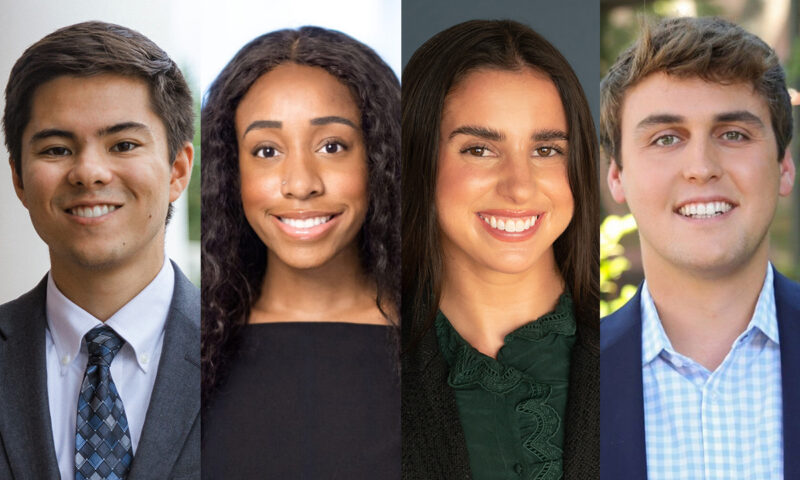
Brian Vahaly and Professor Ryan Nelson. Vahaly was a student in one of the earliest classes to study in McIntire’s Integrated Core curriculum. (Photo courtesy of Ryan Nelson)
Twenty-four years after he walked the Lawn, Brian Vahaly’s legacy stands strongly, as his contributions have enshrined him as one of the best athletes in the University of Virginia’s storied sports history. As a student-athlete, he not only reached previously unattained achievements on UVA’s tennis court, he was also part of a critical pioneering moment at McIntire as a student in one of the earliest classes to study in the Commerce School’s now hallmark Integrated Core curriculum.
So when Vahaly eventually stepped away from competitive tennis courts after a seven-year run and into the corporate boardrooms, where he would begin applying his skills in a business context, it represented a logical pivot to merge what he learned from years of professional sports and his foundational education at McIntire. As a testament to the power of immersive, interconnected learning, Vahaly’s journey demonstrates how the skills that come from the Comm School extend into many arenas.
“I saw the Integrated Core as an early version of a graduate-level experience—it pushed us to think across disciplines such as strategy, communication, and operations. It instilled an appreciation for how these functions intersect and taught me the importance of collaborating across teams with diverse expertise,” Vahaly reflects. “That kind of interdisciplinary thinking has shaped how I lead, solve problems, and build organizations that can adapt and grow.”
As his career unfolded, he moved into operational and executive leadership positions, spending time over the years in C-suite roles for companies ranging from McLean Capital, EveryoneOn, and Venturehouse Group to NextGen Venture Partners, [solidcore], and YouFit Gyms.
 Currently, he serves as Senior Adviser at Brown Advisory, an independent investment management and strategic advisory firm of 900 global members, all of whom own equity in the firm. He was recently elected by the board to serve as Interim Co-CEO of the U.S. Tennis Association (USTA), where he also serves as Chairman of the Board and President. The USTA is the national governing body for tennis and oversees the sport’s development at every level across the country, including staging the annual US Open. He also serves on the board of the International Tennis Integrity Agency and is a Board Member of Cavalier Futures, supporting the next generation of Virginia student-athletes.
Currently, he serves as Senior Adviser at Brown Advisory, an independent investment management and strategic advisory firm of 900 global members, all of whom own equity in the firm. He was recently elected by the board to serve as Interim Co-CEO of the U.S. Tennis Association (USTA), where he also serves as Chairman of the Board and President. The USTA is the national governing body for tennis and oversees the sport’s development at every level across the country, including staging the annual US Open. He also serves on the board of the International Tennis Integrity Agency and is a Board Member of Cavalier Futures, supporting the next generation of Virginia student-athletes.
We caught up with Vahaly to find out what his chosen sport has taught him off the court while he aims to grow and protect tennis, and the ways athletics and academics supercharged his career.
Strategic Insight from the Sidelines to the Boardroom
Having played tennis since childhood, Vahaly attended the University of Virginia, where he became the school’s first tennis All-American in 1999. He was named UVA’s Male Athlete of the Year, a two-time ACC Player of the Year, and ACC Rookie of the Year. A three-time All-American, he remains one of the most decorated players in Virginia tennis history. But beyond the thrill of competition and the accolades that came from thriving at the game, tennis provided him with a set of invaluable lessons.

(Photo courtesy Brian Vahaly)
“Tennis taught me how to perform under pressure, handle defeat, and prepare relentlessly,” Vahaly states of the abilities that translated directly into his post-tennis business career. “It gave me a deep appreciation for strategy, execution, managing setbacks, and showing up every day with persistence.”
He adds that these habits “translated directly into a business context, especially when challenges arose or situations were ambiguous,” noting how most commercial and organizational endeavors are defined by uncertainty and a lack of clarity. “You’ve got certain data, historical information, and a hunch, but the reality is you have to make decisions on a tennis court, in business, and in life with trusting your gut.”
Vahaly says that learning to move with an informed instinct is something he can trace back to the Comm School. “McIntire really challenged us. You always wanted more information because you always wanted to make the perfect decision, but that’s not how it works. What I loved about case studies was getting to walk through real decisions that business leaders had to make. You’d weigh the information, make your call, and then learn what actually happened—what worked, what didn’t, and why. That kind of practical reflection stuck with me.”
He believes that many hinder their opportunity to lead because they’re uncomfortable being decisive. “People often hesitate to make the call because they’re afraid of being wrong,” he says. “But in leadership, that’s part of the job. You have to make tough decisions in the face of ambiguity, push the team forward, and still have the humility to course-correct when needed. That balance is what real leadership looks like.”
As his career progressed and he took on more leadership roles, he found that working in teams on larger projects at McIntire had been nothing short of transformative. “It taught me how to research, analyze competitive dynamics, and craft solid execution strategies. But most importantly, it helped me develop conviction in my ideas, to communicate clearly, and to influence others,” Vahaly insists. “It’s one thing to come up with a good idea—but another to inspire action around it.”
A Strategy and Integrity Champion
In his current roles as Senior Adviser at Brown Advisory and USTA Chairman of the Board and President, Vahaly finds himself at the nexus of strategy, sport, and stewardship. “That starts with rigorous analysis—understanding where the strengths and opportunities lie, and then building internal and external alignment around a shared vision. From there, it becomes about clear, consistent messaging that helps the entire team move in the same direction,” he explains. “Of course, strategy only works when it connects to structure and budget. McIntire gave me early tools and frameworks to think through those connections and lead with clarity.”
“At this stage in my career, I think a lot about how to scale impact in a way that’s lasting and inclusive,” Vahaly says. “One example of that is how we’re approaching USTA Coaching—actively recruiting coaches from more diverse backgrounds so that players at the local level can see themselves reflected in the game. That kind of intentional inclusion matters. It’s helped drive a 49% increase in participation over the last six years, much of it coming from communities that have been historically underrepresented in tennis.”
As he and his team prepare to oversee the USTA’s main multiweek event, the 2025 US Open, which ends Sept. 7, Vahaly is proud of his team’s recent innovation of introducing mixed doubles for a Grand Slam title.
“This year’s Mixed Doubles competition marks a historic first in professional sports—where the top male and female athletes of a sport are not just competing at the same venue, but against each other, for equal prize money and millions of dollars. It’s a powerful reflection of what makes tennis so special. For over 50 years, the US Open has led the way on gender equity, and this innovation continues that legacy. It’s bold, it’s exciting, and it showcases the very best of our sport.”
Vahaly also serves as a Board Member of the International Tennis Integrity Agency, where he assists in its mission to safeguard tennis’s fair play. Given tennis’s global popularity, with popular betting interest second only to horse racing, his role with the organization is crucial. “We ensure outcomes are fair and transparent,” he explains, noting how a focus on maintaining trust in tennis globally steers efforts to center on curbing illegal betting and doping in order to ensure fair play at every level. “Tennis is around 10-11 months a year, and maintaining integrity in matches is key to our fans trusting in the outcome of our tournaments.”
Staying Connected to Grounds
Despite his many high-profile responsibilities, Vahaly’s connection to UVA endures. He continues to maintain ties to the community he cherishes, which offers him a special opportunity to give back and share his knowledge.
“I’ve always felt a deep connection to UVA. I stay close to the tennis team and serve on the board of Cavalier Futures because I want to support the next generation of student-athletes as they find their way. What’s always stuck with me is that UVA attracts people with integrity—people who genuinely care, who show up for one another, and who want to do good in the world. That kind of community stays with you.”he says, revealing that he’s also recently purchased land in Crozet in hopes of spending more time near his alma mater and introducing his children to everything he loves about Charlottesville and being a Hoo.
To current Hoos who are aspiring professionals, Vahaly recommends building on the networks that UVA makes possible: “You don’t need to have everything figured out on day one. What matters most is staying curious, being open to new experiences, and taking the time to build meaningful relationships. UVA has an incredible alumni network—don’t be afraid to use it. Ask questions, learn from others, and keep moving forward.”
Regarding success on the job, he references his own trajectory, promoting forward movement. “Do your research, take decisive action, and avoid analysis paralysis. Trust your instincts, and trust your team,” he says. “That combination can lead to remarkable results.”
Whether steering strategic initiatives, championing fairness in sport, or nurturing the next generation at UVA, his journey reflects the merging paths of passion and purpose—a triumph both on and off the court.


